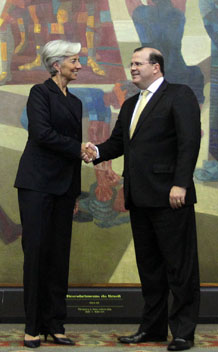BRICS, or Straw Men? Why the Next IMF Head Will Be European
More on:

The resignation of Dominique Strauss-Kahn should have provided a golden opportunity for emerging powers to break Europe’s stranglehold over the Managing Director of the International Monetary Fund (IMF). For years, dynamic developing countries have blasted this prerogative—and the parallel U.S. privilege to name the World Bank president—as arbitrary and archaic, ignoring significant shifts in global economic power and influence since the two institutions began operating in the late 1940s. On May 24 the IMF managing directors of the BRICS countries (Brazil, Russia, India, China and South Africa) released a joint statement calling for a non-European IMF chief.
Multiple experts and institutions, from the Zedillo Commission to the Center for Global Development, have called for an end to Europe’s 64-year privilege. Two years ago in London, G20 leaders effectively endorsed "an open, transparent, and merit-based selection process" to select the World Bank and IMF leadership.
The Obama administration kept mum on Strauss-Kahn’s successor, leaving the door open for rising powers to offer their own candidate. But instead of rallying around a single nominee, as Alan Beattie reports in yesterday’s Financial Times, major emerging players have remained hopelessly divided.
The Russians, for instance, championed Grigory Marchenko, the obscure governor of the Central Bank of Kazahkstan, for the IMF post. Mexico, meanwhile, suggested the more credible Augustin Carstens, a Chicago-trained economist and its own Central Bank governor, but received only lukewarm backing from its regional rival, Brazil. China and India, meanwhile, have been essentially silent. Although the window for nominations remains open until June 10, there seems little prospect that emerging countries will coalesce behind a candidate of their own.
The impasse has increased the momentum behind the candidacy of French Finance Minister Christine Lagarde, advanced by the European Union on the dubious grounds that Europe’s sovereign debt crisis requires a European at the Fund’s helm (whereas one never heard analogous arguments during earlier, Latin or Asian financial crises). Seeking to broaden her support, Lagarde has launched a charm offensive toward the BRICS and other emerging countries, promising to advance reforms (FT) begun under Strauss-Kahn to increase developing country voting rights and representation within the Fund. Yesterday Lagarde was in Brazil, offering soothing words. In the coming week she will visit India, Russia, and Saudi Arabia. And last week she received positive signals from South Korea (FT), broadening her potential global support.
The apparent lesson of this episode is that while emerging powers are quite content to criticize existing global institutional arrangements, they do not yet constitute an effective bloc that can unite behind an agreed program of action. The BRICS—along with Turkey and Mexico, and other rising powers—may one day provide a counterweight to established Western powers. But for now, it is hard to see (Business Week) where that cohesive leadership will come from.
More on:
 Online Store
Online Store
